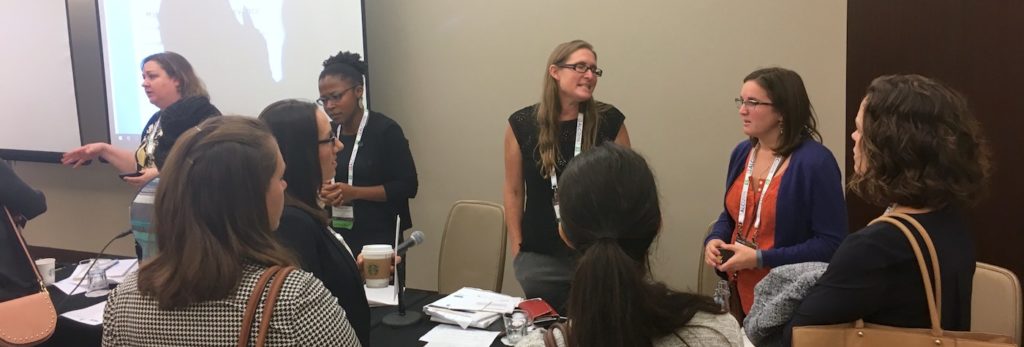
Highlights of our lessons learned, big ideas, and big takeaways!
CEF’s Program Coordinator and Operations Coordinator, Maggie West and Jon Young, rode the Megabus up to DC last month to attend the Assets Learning Conference, hosted by our friends and partners at CFED. Here’s a peek at what got us excited and where we’re taking those ideas next!
Ideas for Better Safe Safe Savings Accounts
- The Five Friday Month: A simple but catalytic idea from JPMorgan & Chase Institute on Income Volatility! During a month with five Fridays, many households have more expendable income than they do in a typical month. How can we leverage that in CEF’s matched savings programs to encourage increased savings during that time in the calendar?
- Gamifying Savings: Simple immediate incentives like congratulatory and animated texts can go a long way to reinforcing positive savings behaviors. Gamification of savings is a hot topic too, with exciting work by Commonwealth. Let’s implement these simple incentives!
- Multi-Generational Saving: So many spaces lifted the importance of whole-family, multi-generational supports, and so many spaces talked about the promise of Children’s Savings Accounts, which got us thinking. What if we could collaborate with fellow providers locally to be able to connect members to Children’s Savings Accounts
- Kickstarting Savings: We were inspired by CFPB and Earn.org’s exploration of saving account structures that incentivize deposits in the initial opening months. What if we explored adding in savings account structures that encourage initial deposits towards a ‘starter’ or monthly goal. Habits of savings could be kickstarted by a goal CEF members can reach in a short amount of time (1-3 months).
Models for Collaboration that improve the financial well-being of lower-resource households:
Financial Empowerment through Municipalities
- Cities for Financial Empowerment Fund — emphasizes that financial empowerment services should be provided as a public service by municipalities. Financial counselors one-on-one supports available writ-large, and the city contracts with nonprofit organizations to implement the program. Evaluation results coming shortly, but all signs point to fantastic outcomes!
- Credit Building through Rent Reporting:
- AHC, Inc. of Greater Baltimore has integrated financial coaching, incentivized savings, incentivized automatic bill-pay, and rent reporting for their tenants
- Partner with Public Utility companies to offer credit and cash-flow coaching!
- In the LIFT-UP Model utility companies worked closely with financial empowerment centers to refer customers who were behind on their water bill specifically in order to avoid late fees, reconnect fees, or other fees. Evaluation showed a reduction in overall debt and an increase in on-time payments from participants.

CEF’s Maggie West presented on a panel for “From Crisis to Financial Stability” at the conference!
Financial apps are “in,” and CEF has some cool tools to add to the mix!
- Lots of apps (#fintech) are being rolled out to make financial coaching and saving more accessible to providers and consumers alike. In the context of the larger, nationally scaled world of apps, CEF’s ability to create technological solutions that are hyper-relevant to our local community (like OCconnect.info) is rare and valuable.
Invaluable research and analysis about :
- According to a Federal Reserve Survey, about 46 percent of Americans said they did not have enough money to cover a $400 emergency expense. Our Safe Savings Accounts and Renter’s Savings Accounts have even more relevance than we could have guessed! Almost half of households in the country could benefit from this targeted and structured opportunity to save towards both short-term and longer-term goals.
- 60% of US households receive their income not on a monthly schedule (e.g. weekly or bi-weekly) while 60% of household expenses are billed on a monthly basis. This fundamental mismatch exacerbates household financial insecurity. This mismatch leads to opportunity in our financial coaching in terms of how we support members in cash-flow budgeting. For example, if members receive their income bi-monthly, bi-monthly payments of bills might make more sense for their cash flow.
- The Ever-Growing Gap details the need for transformative policy change in order to truly end the racial wealth divide, showing that if we continue at similar rates to date, “Black families would not reach wealth parity with White households until the year 2241.” 228 years! Read the report to learn more about CFED’s policy recommendations.
So many ideas, sessions, and conversations inspired us to deeper reflection and thoughtful action…. far too many to name here! Moreover, the opportunity to connect with groups from all over the country who share our commitment to improving financial well-being through creative and responsive strategies was reinvigorating and exciting!



No comments yet.